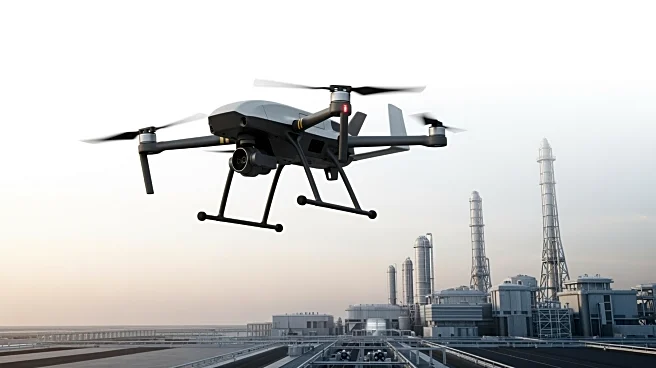What's Happening?
Sweden has significantly bolstered Ukraine's military capabilities by funding the production of 400 long-range drones, which are used to target Russian oil refineries. This development was announced by Ukraine's Defense
Minister Denys Shmyhal, who highlighted the cooperation between Ukraine and Sweden in defense technology innovation. Sweden has been a steadfast ally to Ukraine, providing over $9 billion in aid since the onset of Russia's full-scale war in 2022. The Nordic country plans to continue its support with an additional $8 billion allocated for military aid in 2026 and 2027. Sweden's contribution includes advanced weaponry such as the Saab JAS 39 Gripen E fighter jets and the Archer artillery system, enhancing Ukraine's ability to conduct deep strikes into Russian territory.
Why It's Important?
The support from Sweden is crucial for Ukraine as it seeks to disrupt Russian logistics and weaken its military capabilities from a distance. The drones funded by Sweden allow Ukraine to strike deep into Russian territory, targeting critical infrastructure like oil refineries. This strategy aims to create logistical challenges for Russia and potentially impact its war efforts. Sweden's continued military aid underscores the international support for Ukraine and highlights the geopolitical dynamics at play. The provision of advanced weaponry like the Gripen E fighter jets and Archer artillery systems further strengthens Ukraine's defense capabilities, potentially altering the balance of power in the region.
What's Next?
Ukraine's partnership with Sweden marks a significant step in its efforts to domestically produce long-range weapons, addressing Western hesitations in providing missiles capable of striking Russia. As Ukraine continues to enhance its military capabilities, it may increase the frequency and intensity of strikes on Russian territory, further straining Russia's logistics and resources. The ongoing support from Sweden and other Western allies is likely to continue, with potential implications for the broader geopolitical landscape and the future of the conflict.
Beyond the Headlines
The collaboration between Ukraine and Sweden in defense technology innovation could have long-term implications for the defense industry, potentially leading to advancements in drone technology and military strategy. The ethical considerations of using drones for strikes on critical infrastructure also warrant attention, as they raise questions about the impact on civilian populations and the environment. Additionally, the partnership highlights the role of international alliances in shaping the outcomes of conflicts and the importance of technological superiority in modern warfare.










